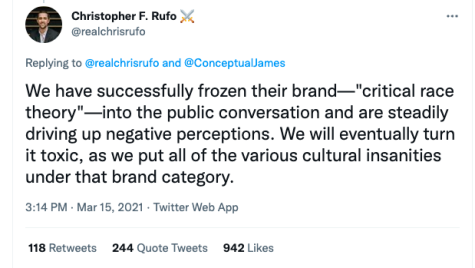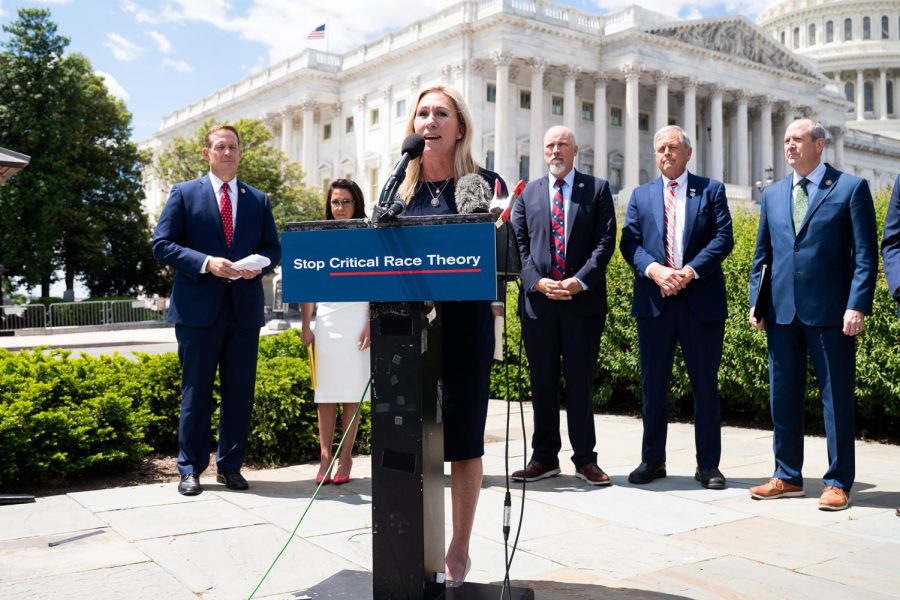What is Critical Race Theory anyway?
Critical Race Theory has been a term thrown around everywhere recently, so what is it?
Marjorie Taylor Greene (R-Ga.) speaking with other Republican lawmakers in June
November 26, 2021
It seems like everyone from social media users, cable news anchors, politicians and parents at school board meetings have been talking about Critical Race Theory, or CRT. Its mere existence has seemed to cause heated debates among different areas on the political spectrum, but many students and teachers at RV have little to say on the matter. So, what is it, and why is it so controversial?
Critical Race Theory refers to both the intellectual movement and a way of analyzing the law. According to Encyclopedia Britannica, the two beliefs that makeup CRT are, “(1) race is a culturally invented category used to oppress people of color and (2) the law and legal institutions in the United States are inherently racist insofar as they function to create and maintain social, political and economic inequalities between white and nonwhite people.”
Critical Race Theory was originally attributed to prominent scholar and civil rights lawyer Derrick Bell and his 1973 book, “Race, Racism and American Law.” Bell famously criticized the 1955 Brown v. Board of Education decision, saying that it wasn’t moving black students forward educationally. Rather, the decision created new problems for black students, and that rather than integrate, the country should make a concerted effort to improve public education for black students.
Contemporary understandings of CRT examine issues of race in social, economic and political areas through the lens of law. While CRT has existed in academia for decades, its recent resurgence in public discourse may be connected to a number of recent events and publications about racism in America. The 2019 publication of the controversial “1619 project” by Nikole Hannah-Jones, which “aims to reframe the country’s history by placing the consequences of slavery and the contributions of Black Americans at the very center of the United States’ national narrative,” sparked widespread backlash against how the history of racism is taught in public schools from both the right and the left. In addition, the racial reckoning in the summer of 2020 following the death of George Floyd at the hands of a Minneapolis police officer also put the teaching of racism in schools in the spotlight.
Critical Race Theory became an even bigger flashpoint in the gubernatorial campaigns in Virginia and New Jersey, which received national attention. Conservatives Glenn Youngkin in Virginia and Jack Ciattarelli in New Jersey campaigned on platforms that condemned CRT in public schools, despite the fact that schools in both states do not include CRT in their state standards. Many political analysts point to Youngkin’s win as demonstrative of how powerful CRT can be as a talking point.
Conservative talk show hosts, influencers and politicians have been using CRT as a way to rally their supporters in recent local elections. Some are subscribing to the idea that CRT is indoctrinating white children into feeling guilty for the history and longevity of racism in this country. An example of this is Republican Congressman Matt Gaetz calling CRT “a poison” while advocating for its teaching to be banned from military academies. In March, Christopher F. Rufo, a conservative scholar and member of the Manhattan Institute, tweeted “We have successfully frozen their brand—‘critical race theory’—into the public conversation and are steadily driving up negative perceptions. We will eventually turn it toxic, as we put all of the various cultural insanities under that brand category.” Much of his social media is devoted to vilifying CRT and instigating debates about schools, and he does not shy away from discussing his strategy to consciously make the larger conversation about CRT more problematic.

As a result of the heat in the media concerning CRT, local schools and school board meetings have become the latest battlegrounds for the ongoing culture wars between right and left wing groups. In May, according to a local NBC affiliate, WXIA-TV, angry parents of students in Forsyth County Schools (FCS) in Georgia complained to their school board about the alleged teaching of CRT. According to some parents, FCS’ Diversity, Equity, and Inclusion Initiative (DEI) is a gateway into their children being indoctrinated by CRT. According to Reuters, one school board meeting in Loudoun County, Virginia, in June became chaotic when parents complained about the alleged teaching of CRT, and ended with two people getting arrested.
Despite the controversy about CRT, especially in school board meetings, most Americans cannot accurately define it as it was originally created by Bell. Many supporters on the right and the left find this surprising, and arguably concerning, considering how prevalent CRT has been in the news.
According to an Economist/YouGov poll, only 35% of American adults think they understand what CRT is. The poll did not test recipients on their knowledge of CRT, which means the amount of American adults that know what CRT is probably smaller. Out of the 35% of American adults who claimed to know what CRT is, 20% viewed it negatively and 13% viewed it positively. In addition, another 35% of adults haven’t heard of the term.
The lack of knowledge about CRT extends to students at Rancocas Valley Regional High School. That is not surprising considering that CRT is not taught at RV.
“[It is] basically talking about racism…in classrooms, [and] what they are teaching in school about racism,” sophomore Aaron O’Keeffe said when asked what CRT is.
Some students like, junior Ariana Redd, have heard of CRT but when we asked her if she knew what CRT is, she replied “No.”
There are also plenty of students, like freshman Shasha Haynes, who have not even heard of CRT and had no comment on it.
Despite the fact that many Americans lack knowledge about CRT and what it actually entails, the debate over the idea has, perhaps ironically, translated into legislation against it. Lawmakers across the United States that share anti-CRT opinions have been trying to prevent its teaching in public schools. Texas, Florida, Tennessee and other states have passed laws that ban the teaching of CRT. Many left-wing politicians and advocates claim that these laws could prevent students from getting an accurate teaching of the history of racism in America, including accurate perspectives regarding enslavement of African Americans, Jim Crow laws and the removal of Native American peoples at the hands of the US government.
The Texas law, for example, makes it optional to teach many crucial aspects of American history. These include Martin Luther King Jr.’s “I Have a Dream” speech, the notion that the KKK was morally wrong, the writings of women’s suffrage leader Susan B. Anthony and Native American history. The author of the law, State Rep. Steve Toth claimed he wrote the law so schools can teach “complex subjects like slavery and racism without making white children feel guilty.”
However people define it or think about it, CRT has become a massive part of America’s political discourse — and is likely not going anywhere. That is especially true inside school board meetings. RV, however, has not seen any of the fiery debate over CRT in classrooms or school board meetings.
“CRT has never been an area of focus or interest in our district,” said William Connolly, Director of Curriculum and Instruction at RV. “From our reading of it, it is a higher education concept. While we are aware of the complex debate taking place, we are more focused on helping our students and staff recover from a very challenging year and a half.”
While the debate over CRT continues to rage on in national news outlets, the RV community appears to be exempt from the hostility dominating both political parties over the issue.








Barbara • Nov 27, 2021 at 12:11 pm
Liked the
Clarity of the article. It’s just beginning to be introduced to the school system. This is not meant for young students. I believe it’s important to recognize subtle or overt negativity to minority groups. That would be a beginning.